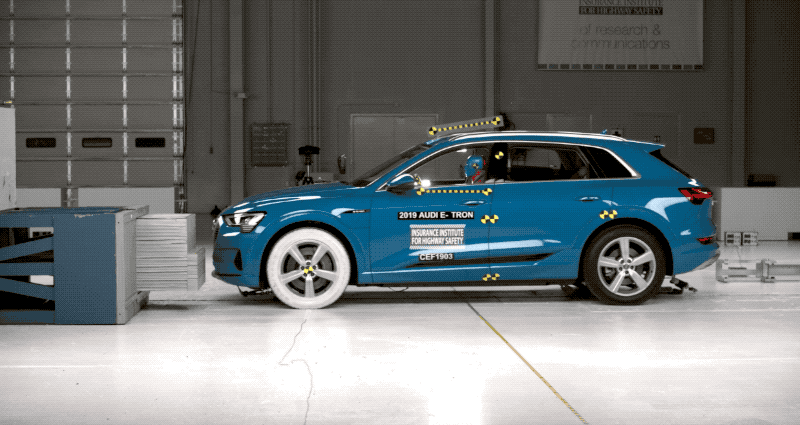The Audi E-Tron Beats Chevy Bolt, Tesla Model S In IIHS Safety Tests
It's still pretty rare to see a full-battery vehicle rated by the Insurance Institute for Highway Safety, because there still aren't that many of them. Even rarer is what the 2019 Audi E-Tron achieved: the Top Safety Pick+ award, making it the first battery-electric car to get that distinction.
It's no easy feat to get a top safety award—the car has to pass six crashworthiness tests, including a rating of "advanced" or "superior" for front crash prevention and headlights. The Chevy Bolt and the Tesla Model S have both been tested by IIHS and failed to do what the E-Tron did.
You can read the full IIHS report here, but basically, all you need to know is that the E-Tron kicked ass. It took home the highest possible distinctions across the board.
Because EVs don't have a big engine in the front of the car to take the brunt of a head-on collision, it could theoretically be a pretty significant weak spot for the car. But Audi specifically designed a honeycomb frame to separate their battery modules with the intention of dissipating frontal impact energy.
And it's especially good for the E-Tron, which has had a real hard time successfully integrating into the market as Audi's first-ever mass-produced EV. After its release was delayed amid a battery shortage, it was voluntarily recalled in the US due to potential battery fires. Kind of a downer for that whole "wanting to buy this car" thing.
So, how did other EVs fare in the IIHS test? Tesla's 2017 Model S did OK on most fronts, but it was lacking in several others: the small frontal overlap was ranked as acceptable, the child seat anchors were moderate, and headlights were poor. The 2019 Chevy Bolt also scored a moderate on child seat anchors and poor on headlights.
While that's not a ton of competition for the E-Tron to succeed over, the playing field is about to grow. The IIHS has confirmed that it's beginning to test the Tesla Model 3—it'll be interesting to see how the two compare, and if Tesla will be able to better itself after previous IIHS outings.
